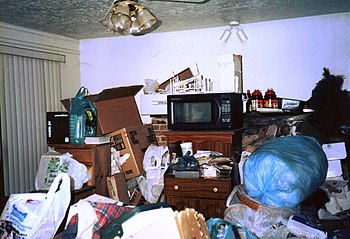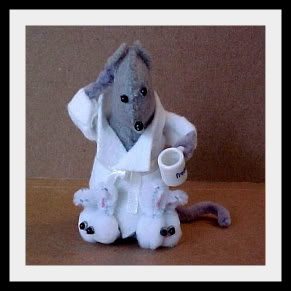There is a flip-side to the clutter issue. This was something that I read about and I believe I heard of on the news around 6 or 7 years ago when I last moved. I was researching the subject of reducing clutter in anticipation of that move.
In my research I found something about the folks with a with disabilities that are on the road to eventually being homeless. The issue is that with each move they are forced to make — to less and less expensive accommodations — they are forced to divest themselves of possessions.
There are many exceptions of course, represented by those folks living out of a multitude of shopping carts or living in a warren of appliance boxes and crates.
There is that problem of a person basically losing a bit of themselves with every move they make. Precious keepsakes get lost, sold, or stolen. House-ware such as the basics like pots, pans and linens are reduced until not enough to sustain a household are left.
Eventually a person ends up with just the clothes on their back; the shoes on their feet; and perhaps a shoulder bag with a few prized possessions. They end up losing that mooring in life we call possessions. Writing as a person with issues surrounding hoarding and clutter I can see this sort of thing being a double-edged sword.
On the one hand, we can be anchored too soundly by our possessions. They can keep us from doing those things we most want to do by taking up every nook and cranny of our lives. “Excess baggage” is the term that comes to mind. But I have seen images fo the homes of hoarders where even the kitchen becomes a closet and no cooking can be done… or safely done. A person that might get joy out of cooking no longer has access to their stove. Too many possessions can be a burden.
On the flip-side, slowly losing everything is like cutting ties with your past. You lose the treasured photos of friends and family both alive and dead. You also lose any record of contact you might have with these people. You lose the ability to move into a place with a kitchen and be able to cook without repurchasing those pots and pans that you got rid of.
In some ways you lose your place in society.
I know there are some that live quite well with a minimum of possessions, in fact people who are quite happy in a Spartan environment.
I don’t know if these are the exceptions or the rule?
I would have problems living without familiar possessions — though i think I might like being in touch with some things that those possession represent.
But, I don’t want to get rid of my Father’s portrait and his old hard hat. I don’t want to get rid of my library of books that I have collected over the years. I don’t want to get rid of the tools that I use for painting, sewing, leather-work, or computer repair.
I wouldn’t mind getting rid of some broken things and a build-up of recyclables. For some reason they keep piling up… oh yeah, if I get rid of them they won’t pile up… if it were only so simple, for me.
Dusty
D. Cluttermouse.
















 Howdy!
Howdy!
